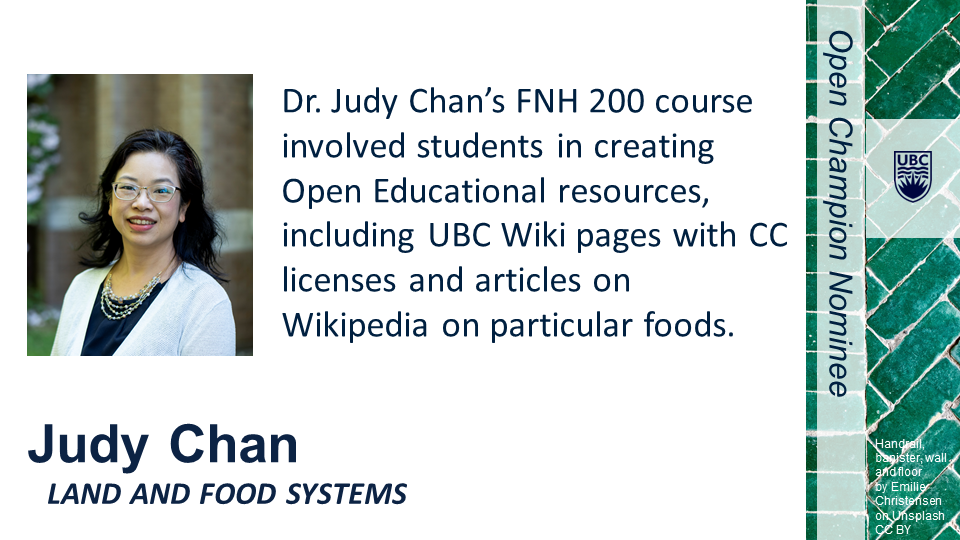This week, we hear from Judy Chan, Faculty Associate and Faculty Liaison (Land and Food Systems) at the Centre for Teaching, Learning, and Technology.
~~~
What motivated you do adopt/adapt/create open educational resources in your work?The quality of my students’ research papers were simply too good not to be shared more widely. I initially set up poster presentations so that students can view and learn from each other’s projects. I later asked them to post their projects on UBC Wiki. Eventually, they were better than some articles available on Wikipedia and I began to ask my students in FNH 200 to contribute to existing Wikipedia pages on foods.
Can you tell us about the open education projects you have been working on?I asked my students to contribute to existing Wikipedia pages on foods through two assignments. I ask them to focus on Canadian regulations on different food items on the first assignment. In the second assignment, I ask them to explore topics such as chemistry, microbiology, safety of foods they like to explore. More importantly, before they started, they need to identify existing gaps in scientific information on foods on Wikipedia. Students learned to recognize gaps in knowledge, then attempted to add scientific details that meet the needs of the general public.
What benefits have you seen from using open educational resources in the classroom?Students learn about their roles in knowledge translation. While they learn about the complex chemical, biological, engineering, and legal regulations in our food systems, they recognize the importance of having these complex concepts complaint in simple everyday language and terms for wide spread knowledge sharing.
What was the biggest challenge you faced and how did you overcome it?Criticism from the world wide web is my biggest ‘challenge’. Food is such as sentimental topics for many people, communities, societies, and cultures. Scientific details on foods may be seen as off-topic. I like to engage with ‘academic Wikipedians’ to help me refine my assignments to that my students can contribute to something needed by the Wikipedia community.
Do you have any advice for other faculty developing OER?Any small steps help. Before we start, it is important to ask ourselves why we want to promote open education and stick that reason everywhere. Any small step we make towards the goal is significant.
Is there anything else you’d like to add about OER at UBC?We have the privilege to play a role in knowledge discovery and it is our responsibility to disseminate knowledge widely and openly to our students and the society.
~~~
Thank you, Judy, for taking the time to participate!

